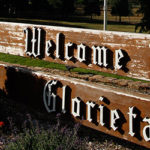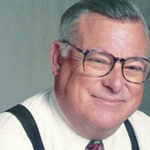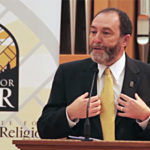BROWNWOOD—Most Christians—especially Baptists— miss the rest and restoration that can be found in the Lord’s Supper, said Beth Newman, the keynote speaker for Howard Payne University’s Currie-Strickland Distinguished Lectures in Christian Ethics.
 Beth NewmanNewman, the Eula Mae and John Baugh Professor of Theology and Ethics at the Baptist Theological Seminary at Richmond, said communion with God should bring the ultimate rest.
Beth NewmanNewman, the Eula Mae and John Baugh Professor of Theology and Ethics at the Baptist Theological Seminary at Richmond, said communion with God should bring the ultimate rest.
“True rest is a gift that heals our restless selves. True rest is grounded in worship and particularly the Lord’s Supper,” she said.
Many Christians consider rest a waste of time, and therefore are suspicious of it, Newman admitted. The Bible seems to echo that thought in several passages, including the parable of the talents, she noted.
In modern culture, people constantly need to be producing as well as consuming the latest in technology. Having enough wealth is an alien concept in society, she said.
Often, people take vacations only to recharge so they can work more effectively, Newman pointed out.
Ultimate leisure stems from communion with God, she said.
Guests of the divine host
“True leisure is allowing ourselves to be guests of a divine host where we receive more than we could possibly hope or even imagine,” Newman said during her lecture, “Rest and Re-creation: The Lord’s Supper as Divine Plentitude.”
Sign up for our weekly edition and get all our headlines in your inbox on Thursdays
It is possible to be deceived by an artificial rest such as when Dorothy and her comrades fell asleep in the poppy field during the Wizard of Oz, she said.
 Gathering after the lecture were Bill Ellis, Howard Paye University president, and his wife Diana; Clark Elliston, son of Gary and Molli Elliston, HPU donors; Molli Elliston; Beth Newman, guest speaker; Carolyn Strickland, wife of the late Phil Strickland; and Loretta and David Currie. The Currie-Strickland lecture series is made possible through the generosity of the Ellistons and was established to honor the life of David R. Currie, retired executive director of Texas Baptists Committed, and the memory of Phil Strickland, who dedicated nearly 40 years of ministry to the Texas Baptist Christian Life Commission.“This rest is deceptive because it prevents them from arriving at their true destiny. It is a false rest. It is a rest that leads to death,” she said.
Gathering after the lecture were Bill Ellis, Howard Paye University president, and his wife Diana; Clark Elliston, son of Gary and Molli Elliston, HPU donors; Molli Elliston; Beth Newman, guest speaker; Carolyn Strickland, wife of the late Phil Strickland; and Loretta and David Currie. The Currie-Strickland lecture series is made possible through the generosity of the Ellistons and was established to honor the life of David R. Currie, retired executive director of Texas Baptists Committed, and the memory of Phil Strickland, who dedicated nearly 40 years of ministry to the Texas Baptist Christian Life Commission.“This rest is deceptive because it prevents them from arriving at their true destiny. It is a false rest. It is a rest that leads to death,” she said.
The Lord’s Supper more closely approximates the type of rest found in the novel and movie Babette’s Feast, where a community feast breaks down long-held strongholds of mistrust and ill feelings.
A feast described in Isaiah 25 exemplifies the bounty available through communion with God, Newman said.
“This eschatological banquet celebrates life and proclaims the defeat of death as do other holy meals throughout Scripture,” she said. They include the manna God provided the Israelites in the wilderness and the Passover.
“When Jesus identifies himself with the Passover lamb—‘my blood shed for you’—he is saying that this sacrifice, a sacrifice of love, is the source of divine abundant life. Christ’s body broken for you—the Bread of Life—is a sacrifice that swallows death. The gift of Christ’s body and blood was a gift so extravagant, it could never be used up. Divine life cannot be depleted,” Newman said.
It is possible, though, to rob ourselves of this gift, she continued.
Temptation to downplay the Lord’s Supper
“For the modern mind, perhaps especially the modern Baptist mind, it can be tempting to downplay the extravagance of this holy meal,” Newman said.
The church she grew up in celebrated the Lord’s Supper four times a year with bits of bread and small cups of juice.
“This was certainly not a meal anyone could actually live on. But it wasn’t a real meal; it was just a symbol,” she said.
On the other hand, potluck dinners filling tables that groaned under the weight of the food were real meals. The dichotomy seemed to minimize the Lord’s Supper.
“The meal we shared at the Lord’s table was only a reminder of something long ago and far away. Any act that involves a mere formality has the potential to become lifeless—whether it is preaching, praying, teaching, etc.,” Newman said.
“As Baptists approached a mere symbolic approach to the table, it became more likely that the Lord’s Supper was celebrated in a perfunctory way. If it is only symbolic, why have it as a central part of worship?
“Jesus commanded it, and therefore Baptists have seen it rightly as an ordinance, but even here the practice is easily reduced to the obligatory—voiding it of its life-giving power.”
But if the Lord’s Supper isn’t just a symbol, what is it?
Bread of life
“In the Lord’s Supper, we are participating in the world as it really is. This is a messianic banquet as prophesied in Isaiah. Christ is the Bread of Life,” Newman said.
The key is to connect the present with the overall scope of what God has done and is doing in the world, she emphasized.
“The temptation is to see the Lord’s Supper as merely a moment frozen in the past or the present. The story that makes possible the Lord’s Supper is woven into a larger narrative, a cosmic story in which the past is not gone and the future already impinges on our lives, drawing us into God’s new creation.
“Our remembrance of the Lord’s table, then, is not a mental effort to recall a past long ago—like trying to remember the name of your teacher from first grade or the face of a loved one no longer with us,” she said.
“When Jesus said, ‘Do this in remembrance of me,’ he is not asking us to simply recall a past event. He is rather inviting us to enter into a time now renewed.
Knit together
“Through this holy feast, we are knit together by Christ’s sacrifice, by the gifts of bread and wine, so that we live more fully the drama of God’s time with us.”
When Christians receive God through the holy table, they are being transformed in ways they can’t always see or even name, she asserted.
“To eat this meal is to become one body,” Newman said.
“The gifts and love of God are so abundant that no one person can fully see and receive them. This is why, as Paul states, the body has many members. We need one another at the table to receive God’s plentitude.”















We seek to connect God’s story and God’s people around the world. To learn more about God’s story, click here.
Send comments and feedback to Eric Black, our editor. For comments to be published, please specify “letter to the editor.” Maximum length for publication is 300 words.